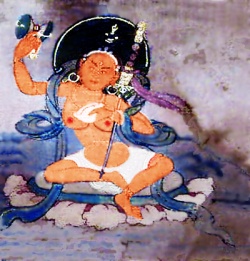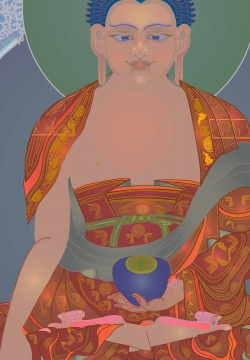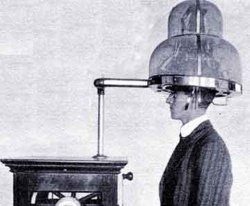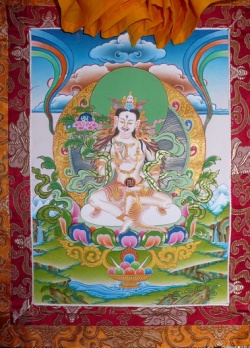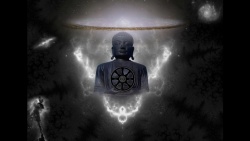The Influence of Buddhism on Bhutanese trial system
By: Lungten Dubgyur
I. Abstract
This paper is an attempt to explain the influence of Buddhism on the Bhutanese Criminal Trial System particularly with reference to Karma Lingpa's Bardo Thodrel- the judgment of the Dead. The fourteen century text by Karma Lingpa is a fascinating legal and historical source, on which the most modern Criminal Procedure of Bhutan is based by the enactment of our historic Civil and Criminal Procedure Code in the year 2001. Therefore, the author attempts to highlight some of the profound legal process and principles that have been adopted and followed when rendering the judgment of the dead to the accused (defendant) in relevance to the modern Criminal trial. The author notes, in particular, the many aspects of Bhutanese criminal procedure which pre-date their Western equivalents.
II. Introduction
The influence of religion as one of the most important sources of our law cannot be ignored. As prevails in many legal systems of other countries, Buddhism has played a very important role especially in the context of the Bhutanese Criminal Trial System. Under the Bhutanese Criminal Trial System, one cannot deny the adoption of certain profound practices and the standard of criminal justice system influenced through Buddhism for various centuries. In general, if one were to ask whether Bhutanese legal system falls in any one of the Adversarial or Inquisitorial system, it can be argued that the system is based on the adversarial principle of procedure with some elements of the inquisitorial system. According to the Adversarial system, disputes have to be resolved by the courts after giving fair and equal opportunity to present the case by both the parties. The courts in the Adversarial system act like umpires and do not to take sides or show any favour or disfavour to any party. Questions may be asked by the judge to determine the facts and evidence presented before it. However, under any standard criminal procedure, it commences with the arrest of the accused, detention and the production of the accused before a judge, investigation, charge being laid, providing evidence and the commencement of sentencing or acquittal of the accused depending on whether found guilty or innocent.
Under the Bhutanese law the accused or the defendant is presumed innocent until proven guilty. This is ensured through the criminal process of production of the accused before a judge on suspicion of having committed an offence. The accused has the right to bail or the courts remand the accused to judicial custody or police custody depending on the nature of offence. Remand orders may be made for carrying out additional criminal investigation and the filing of charge sheets to the court. The court conducts uninterrupted hearing and depending on the nature of the crime allows public trial represented by a Jabmi (legal Counsel) of one's choice. The presumption of innocence of the accused also ensures through the process that the burdens of proof or the onus propendi beyond reasonable doubt lies on the prosecution. The accused in the trial is also granted fair opportunity to submit counter arguments to challenge the evidence of the prosecution. In each stages of trial, the accused is granted an opportunity to submit written deposition (statement) or testimony (oral submission) to substantiate their legal contentions. Based on facts, evidence and the law, the court hands down reasoned written judgment.
III. Legal Principles enshrined in Bardo Thodrel: in passing the Judgment of the dead.
The elaborate criminal trial process is depicted in Karma Lingpa's fourteen century text introduced in the form of Raksha Mangcham which is performed almost in every corner of the country on the Second Day of their three days festival. In this text backed by dramatized performance of mask dances, almost all principles of fair trial procedure is enshrined in accordance with the principles of natural justice, on which the author would like to focus in this paper. In brief, the legal principles such as the right of habeas corpus (the production of the accused before a judge in person), the right of being represented by a legal counsel, uninterrupted hearing, knowing the charges, prosecution for the crimes, defence through rebuttal, production and establishment of evidence and ratio decidendi (the reasoned decision) based on facts and evidence are some of the principles which are of credible essence under Bhutanese Criminal Laws and jurisprudence and has the source and origin in the Bardo Thoedrel.
IV. The right of Habeas Corpus (Duen na): the accused Nyalbum is produced before the Lord of Purgatory.
In passing the Judgment of the Dead, the trial begins with the report of the appearance of a dead person (the accused, by name of Nyalbum) before the King or Lord of Purgatory, Shenjey Choki Gelpo. Habeas Corpus (ad subjiciendum) is a Latin term, which means, “you may have the body or produce the body". Habeas Corpus is a writ, which requires a person detained by the authorities be brought before a court of law so that the legality of the detention may be examined. The right of appearance in person before a judge guarantees that the person accused for the commission of an offence is not, a person of mistaken identity. The judge establishes that the person who has appeared before the court is of established identity and is alleged for the commission of an offence. Therefore, the Lord asks the accused as to where he has come from and invites submission to be made before the court. “Where have you come from?…. Did you carry out any virtuous deeds and abstain from sinful ones? Tell me what you may have to say now."
V. The Open Trial
The fair and public trial is demonstrated by the fact that the accused Nyalbum is heard in the presence of all the Shingye lakhen. The Shingye lakhen includes Ox, Boar, Garuda, Lion, Raven, Tiger, Leopard, Makara, Wolf, Goat, Horse, Dragon, Male Stag, Snake, Oxen, Monkey, Female Garuda, Bear, Dog, Female Stag, Wild Dog, Sheep, Rat, Hoopoe, Owl and Abominable Snowman. The open or public trial as opposed to in camera (behind closed doors) trial is meant to check against judicial caprice and creates public confidence in fairness, objectivity and impartiality in the criminal process and of the administration of criminal justice. Under Our Criminal Procedure Code, open trial may not be allowed only on certain cases where the courts finds necessary to protect privacy or other reasonable restriction that may be of essence by the nature and circumstance of the case.
VI. The Right to Counsel: the presence of Due Nagpo (Prosecutor) and Lha Karpo (Defence lawyer)
The trial proceeding is presided over by the impartial Lord of Purgatory (Shenjey Choiki Gelpo). The accused is represented by his Defence Counsel Lha Karpo and the Prosecutor represented by Due Nagpo in the presence of the general public represented by many animals in the realm. Under criminal trial of Adversarial system the state is represented by the prosecutor to prosecute the accused and the defence counsel to defend the accused and to counter the facts and evidence of the prosecution. The right to a Jabmi and legal aid is one of the profound principles of legal rights enshrined under Bhutan's Criminal Procedure Code. However, under Bhutanese law the choice for a Jabmi is a personal matter of the accused and no one can impose representation to be made if the accused has competently and intelligently exercises the right of waiver.
VII. The charges: commission of various sins (offences)
In the particular trial, the accused is alleged of the commission of various offences (sins), including the offence against person , property , cultural heritage , wild life & environment , public order and other offences like fraud and defamation .
VIII. Submission to the Court to plead guilty or not guilty (arraignment): an uninterrupted hearing
The court of Purgatory grants the opportunity to plead innocence or guilt to the offence of various sins (offences) committed during the lifetime of the accused. The accused in his submission pleads guilty in affirmative defence. However, the accused argues and pleads that the crimes (sins) were committed in the mitigating circumstances, of extenuating necessity and due to extreme poverty. The accused submits that the crimes were committed out of necessity to support his large family and had no intention to kill. The accused argues that although he was made aware that the commission of sins was bad, he was never aware of the consequences of such actions and the existence of punishment after death. “In my opinion, hell never existed. Thinking that no one has ever returned after seeing hell, I asked the people, “If there is hell, where is it? …….. to me it seemed that below our feet was all earth and stones and above us was empty sky….I never believed in the existence of hell and committed many sins." Further the accused submits that, had he known the actual existence of the consequences of such crimes that he had to face, he would have never committed the crime and submits his regrets and seeks the Lord's mercy.
In this uninterrupted hearing and submission by the accused, profound legal principles of defence such as the defence of mitigating circumstances, poverty as an excuse for the crimes, factual ignorance, lack of intention to cause harm, remorsefulness, pardon for promise of good conduct and mercy pleading for reformation were enshrined of which most of the modern Bhutanese criminology and penology is based and founded upon.
IX. The prosecution by the Due Nagpo: the Prosecutor
The prosecution (Due Nagpo) submits that even if the Lord was powerful (referring for the existence of the discretionary power of the Lord), one cannot be in a position to cleanse and over look the crimes committed.
The prosecution re-iterates that the accused Nyalbum alias Doelpa Nagpo, Nagpo Kuen Sey or Shenpa Lagmar has committed the offence of indiscriminate killings of wild animals and destruction of marine life. The prosecutor further alleges the commission of assault against innocent persons and parents, use of harsh and contemptuous speech, commission of arson by setting forest fires and pollution of ocean, and the commission of the offence of theft and desecration of religious artefacts and monuments. The prosecution demonstrates that the accused has shown no remorse for the crimes and took delight out of such acts and reminds the Lord that the eloquence of speech cannot mitigate the crime. The identity of the accused also get establishes with the corroboration through public knowledge and elimination of mistaken identity by spelling out the criminal records.
Therefore, the prosecutor submits that the accused is guilty of crimes against persons, property, wild life and environment, public order, fraud and defamation and demands no mercy or compassion to be shown for the punishment of such evil and wrong doings. The prosecution accuses the defendant of the commission of the alleged crime wilfully (the existence of guilty mind or Mens rea), knowingly or intentionally and with motive of ulterior objective and achieving personal gratification. The prosecution seeks the Lord's justice for punishment by sending to hell for no one can undo the wrong and submits that by showing compassion would over rule the popular views of the public.
X. The Defence by the Lha Karpo: the Defence Counsel
The right to defence counsel is one of the basic elements of modern criminal trial procedure. The existence of the defence counsel (Lha Karpo) to defend the accused Nyalbum guarantees and demonstrates the right to fair trial proceeding recognized in the court of the Lord of Purgatory.
The Lha Karpo submits that the accused captivated by ignorance, not knowing what is good and bad had committed the crimes (sins) in dullness of mind (being in the state of insanity) and not after having the knowledge of consequences. He pleads that the punishment may be mitigated due to the existence of some good deeds and due to the mitigating circumstances of necessity and submits to the Lord for liberation through compassion.
XI. The submission of evidence: the expert opinion and exhibits
The presentation of facts and evidence before the court also guarantees the right of the accused not to be condemned unheard or without proof beyond reasonable doubts. In this trial the delivery of justice is also enhanced by the presence of witnesses and especially the presence of Monkey (Tre), who submits his expert opinion to the Lord by weighing the arguments against the accused. To establish the conclusiveness of evidence and to substantiate corroborative evidence, the instruments used for the commission of offence are also displayed through exhibits in the court of the Lord.
XII. Judgment: the reasoned decision
The judgment is the final determination of the case supported by reasons based on facts, evidence and relevant provisions of law. In the case of criminal offences the pronouncement of judgment results in conviction or acquittal of the accused.
The King of Purgatory after having heard the submission of the accused Nyalbum in person, the trial having been conducted in open and in the presence of the public represented by his Defence Counsel Lha Karpo, and also after having fully considered the submission of the Prosecutor Due Nagpo, renders reasoned judgment (ratio decidendi) based on facts and evidence of the case. In pronouncing the accused guilty to the crimes after conducting exhaustive trial, the Lord of Purgatory holds that no one can nullify the results of one's own action of the commission of offence. One has to suffer for the wrongs committed by one's own action. Even thousand Buddhas many not be able to liberate and protect the crimes of which one has to reap the fruits. No one can escape from the breach of laws. There is nothing that the Lord can do even if remorse is shown after the commission of offence; the impartial judgment has to be based upon wrong against the right. However, by acknowledging the merits of virtue over evil and by serving the sentence (imprisonment in the hell), the Lord is reformative in his judgment and states that the sinner (prisoner) be liberated and accomplish Buddha hood and be born in the realm of Buddhas.
Primary Sources
Bardo Thosgrol by Karma Lingpa (Fourteenth Centaury –1327 to 1387) -Garun Puran.(Zabchos zhikhro dgongpa rang-grol sridpa bardo dge sdig rang-gzugs stonpa' gdamspa sridpa bardo rang grol zesbya wa)
Raksh Mang Chham (dance performed in the festivals)- Right Side lead by Ox (Raksha), Boar (Phag), Male Garuda (Chhung- Fo), Lion (Singhi), Raven (Ja-rog), Tiger (Tag), Oxen (Lang), Leopard (Zig), Makara (Chhu Sin), Wolf (Chang), Goat (Ra), Horse (Ta), and Dragon (Druk).
Left side led by Male Stag (Shaw- Fo), Snake (Druel), Monkey (Treu), Female Garuda (Chhung–mo), Bear (Dom), Dog (Khi), Female Stag (Shaw–mo), Wild Dog (Faw), Sheep (Lug), Rat (Gew), Hoopoe (Dreto Zen), Owl (Woogpa) and Abominable Snowman (Migoe).
Secondary Sources
Jangchhub Singi alias Tsuendru's Namther; Ashi Nangsa Woebum's rNamthar; Sangay Chhozom's rNamthar; Karma Wangzin's rNamthar Lingsa Chhoki's rNamthar (KMT press, reprint 2003) and Chham Yig by Dasho Nakphel (1970s).
